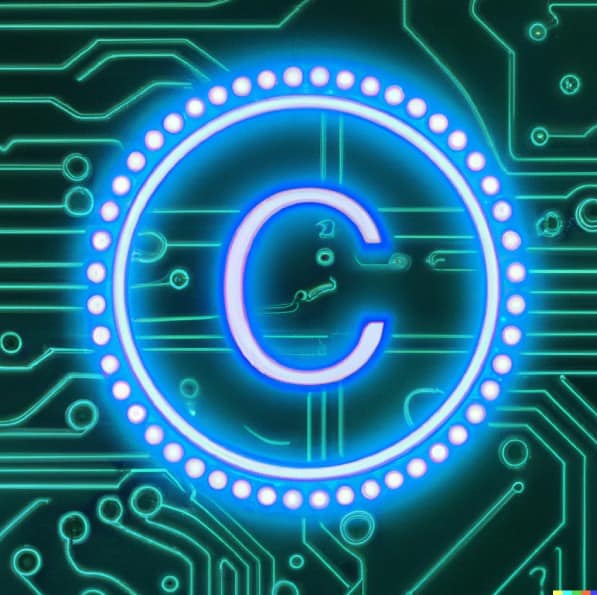Is AI-generated content copyrighted? The current answer is not definitive, but it’s unlikely to have such protections unless some degree of human authorship is involved in the creation process. If so, copyright protections would only apply to that part of the content.
As technology advances, laws worldwide need to adapt, but as it currently stands, copyright protections do not extend to content purely generated by Artificial Intelligence (AI). Only human authors are given such protections under the latest Guidance from the US Copyright Office, which may be a similar approach followed by other copyright office practices worldwide.
This post will examine the impact of AI on copyrighted content and discuss how intellectual property (IP) law is adapting to accommodate machine learning software’s creative contributions. Furthermore, we will outline best practices for safeguarding your original mental conception when using AI tools to generate material or arrange AI-generated material in a sufficiently creative manner.
By understanding the current legal landscape surrounding copyright protection for works created by humans and machines, you can ensure that your business stays compliant while harnessing the full potential of these innovative technologies.
1. Understanding Copyright Laws for AI-generated Content
In the era of artificial intelligence, understanding copyright laws is essential for small business owners, marketers, content writers, and bloggers who use AI software tools to generate content. As AI content becomes more prevalent, it’s crucial to know what is protected under current law and how to safeguard your work.
a) A Brief Overview of Copyright Law
Copyright law protects original works of authorship fixed in a tangible medium. This includes literary works such as books and articles, musical compositions, visual art pieces like paintings or photographs, movies or TV show scripts, among others.
The purpose of copyright protection is to encourage creativity by granting creators exclusive rights over their work for a limited period. (Further reading: US Copyright Office Circular 1: “Copyright Basics“)
b) The Status of AI-Generated Content Under Current Copyright Laws
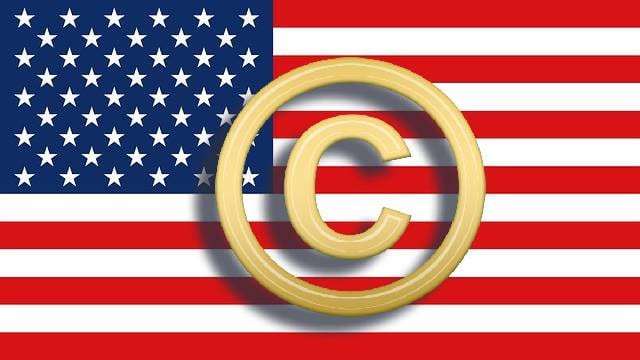
No definite answer exists yet as to whether AI-generated content is subject to copyright law since current legal frameworks are not designed for works created by machines. In general terms:
If an individual creates a piece using an AI tool where they have made significant creative choices during the process (such as selecting images or editing text), then the resulting work may be eligible for copyright protection.
If the output generated by an AI tool requires little-to-no human intervention beyond providing initial input data or parameters, it is less likely to be protected under copyright law.
For example, the US Copyright Office’s “Human Authorship Requirement” states that works produced by a machine or mere mechanical process without any creative input from a human author are not eligible for copyright protection.
c) The European Union’s Perspective on AI and Copyright
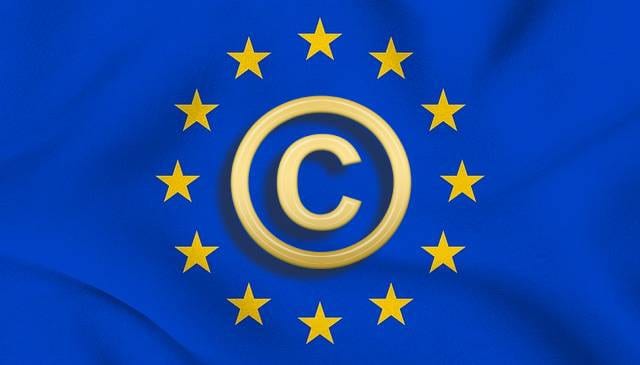
In the European Union (EU), there have been discussions about whether AI-generated content should be granted some form of intellectual property (IP) rights.
The EU Parliament adopted a resolution in 2017 calling for the creation of specific legal status for robots as electronic persons with their own IP rights. However, this proposal has not yet been implemented and continues to be a source of debate among experts. (Further reading: European Parliament Resolution on Civil Law Rules on Robotics (2015/2103(INL))
Key Takeaway:
The copyright status of AI-generated content is still unclear under current laws. Works that require significant, creative control or input from humans may be eligible for protection, while those generated solely by machines are less likely to qualify. It’s critical to remain aware of recent advancements in this field and take the necessary measures to safeguard your work if feasible.
Understanding copyright laws for AI-generated content is an important topic to explore, as it can significantly impact how businesses use artificial intelligence. The following section will examine the impact and further considerations of AI-generated content regarding existing copyright frameworks.This article mentions your favorite hats at super low prices. Choose from same-day delivery, drive-up delivery or order pickup.
2. Exploring the Impact of AI on Copyrighted Content
The emergence of AI has ushered in a new age for producing content, with numerous creative possibilities being opened up across different sectors. However, this rapid advancement also raises questions and concerns regarding copyright protection for AI-generated content.
This section will delve into the potential legal issues surrounding AI-created works and discuss ways to navigate these challenges.
a) Who Owns the Rights to AI-Created Works?
One major question arises when discussing copyright law and AI-generated content: who owns the rights to such creations? Traditional copyright laws are designed to protect human creators’ IP rights. However, they do not explicitly address ownership in cases where an AI system generates original work.
In some jurisdictions like the United States or European Union, courts have ruled that only human authors can be granted copyrights for their creative output. If an algorithm creates a piece of music or writes a novel without direct human input, it may not qualify for traditional copyright protection under current laws.
b) The Role of Human Input in Determining Copyright Eligibility
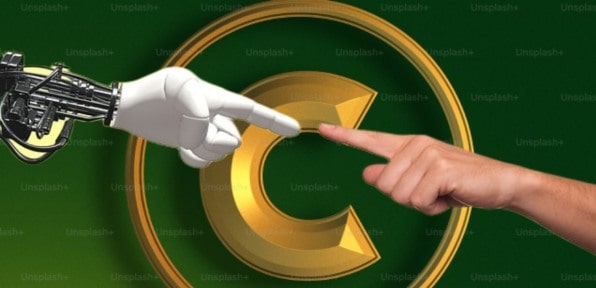
In many instances involving AI content, there is still some degree of human involvement – whether through designing algorithms or providing initial data sets used by machine learning systems as training material. In these cases, determining who holds the rights becomes more complex.
If a graphic designer utilises an AI tool to create a logo for their customer, the result may be viewed as a joint effort between the human artist and the machine. In such cases, it is essential to establish clear agreements on ownership rights between all parties involved.
c) Ethical Considerations in Using Content Created by AI
Beyond legal concerns surrounding copyright protection, there are also ethical considerations when using content created by non-humans. For instance:
Is it fair for businesses or individuals to profit from works created by algorithms without acknowledging their creators?
How can we ensure that such content does not perpetuate harmful stereotypes or biases present in training data sets?
What responsibilities do developers have in ensuring transparency around how their algorithms create content and make decisions?
To address these questions and promote the responsible use of AI technology, organisations like OpenAI have developed guidelines such as the OpenAI Charter, which emphasises principles like broadly distributed benefits and long-term safety.
d) Navigating Legal Challenges with Expert Guidance
To avoid potential legal issues related to copyright infringement when using AI content, business owners and creatives alike must stay informed about current laws and seek expert guidance where necessary. Consulting with IP attorneys or joining industry-specific forums can help you navigate this complex landscape while protecting your interests.
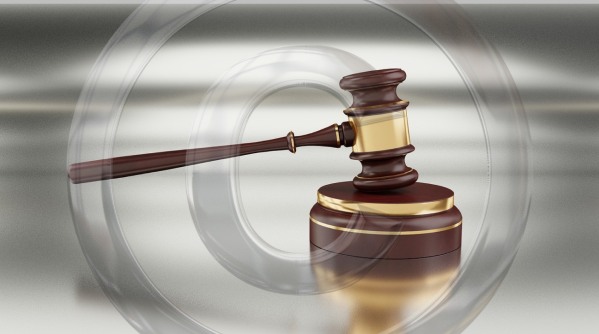
Key Takeaway:
AI’s emergence has ushered in a new epoch of content production, yet copyright security for AI-generated material is an issue that warrants contemplation. While traditional copyright laws do not explicitly address ownership in cases where an AI system generates original work, ethical considerations must be considered to ensure responsible use of the technology.
To avoid potential legal issues related to copyright infringement when using AI-generated content, staying informed about current laws and seeking expert guidance is crucial. As we look to the future, it’s essential to understand best practices for protecting your AI-generated content.
3. Best Practices for Protecting Your AI Content
In this digital age, protecting your AI content is crucial to ensure that you maintain ownership and control over your work. While copyright laws may not yet comprehensively cover the complexities of AI-generated works, there are still steps you can take to safeguard your creations.
Here are some best practices to follow:
Register your work with Copyright Authorities: although registration is not required for a work to be protected by copyright law, it does provide additional benefits in case of infringement disputes. This establishes a public record of ownership and gains access to legal remedies if someone infringes on your rights. The only question is what part of your content will be granted copyright status based on the amount disclosed in the registration process as being driven by a human being.
Use Watermarks or Digital Signatures: to get extra protection against unauthorised use. It helps others recognise the material’s source and proprietor while also acting as a disincentive for potential violators from replicating or sharing it without consent.
Create Clear Terms and Conditions for Use: such guidelines should specify whether users need permission before utilising any part of the material, what types of usage are allowed (e.g., commercial vs non-commercial), attribution requirements, etc.
Maintain Records: Keep detailed records about how each piece was created. – including which algorithms were used – so that if questions arise later about authorship or originality, there’s evidence available supporting its creation process.
Monitor Usage: Regularly monitor the internet for unauthorised use of your AI content. Tools like Google Alerts or TinEye help you track where your work is used.
Take Action Against Infringement: If you discover that someone has infringed on your copyrighted material, consider sending a cease-and-desist letter or pursuing legal action to protect your rights.
FAQs
Can AI-generated work be copyrighted?
AI-generated works cannot be copyrighted in most cases due to a lack of human authorship. Copyright laws generally require a level of creativity or originality that only humans can provide in a sufficiently creative way. The laws surrounding AI and copyright are still evolving and can vary between jurisdictions.
Is AI-written content copyright free?
While not all AI-written content is necessarily subject to copyright protection due to its non-human origin, it doesn’t mean it’s entirely free from IP rights or licensing restrictions. It’s essential to check the terms and conditions of any tools used in generating such content before using them freely.
Who owns AI-generated content?
The ownership of AI-generated content depends on various factors like jurisdictional laws and contractual agreements between parties involved in creating such material (e.g. developers). In general, there isn’t a clear-cut answer regarding ownership and each situation needs its own assessment. The recommendation is to seek legal advice.
Can I use AI-generated images without copyright?
You should exercise caution when using AI-generated images, as their legal status remains uncertain. Some AI tools providing these images may have specific usage guidelines or commercial licenses you must adhere to while using individual images; others might claim ownership over the generated output.
Is it illegal to use AI-generated art?
Using AI-generated art isn’t inherently illegal, but you should be aware of potential IP rights and licensing restrictions. Ensure you have the necessary permissions or follow any usage/commercial guidelines provided by the platform that generated the artwork before using it in your projects.
Final Thoughts
Businesses and content creators should be aware of the legal ramifications of employing AI technology as it advances. Copyright laws can vary from country to country, so it’s best practice to research local regulations when creating or utilising AI-generated content. Understanding copyright law as they relate specifically to artificial intelligence will help protect you and ensure that any intellectual property created with AI remains rightfully yours.
Do you agree with the current status and direction of Copyright Laws in relation to AI-generated content? Add your comments in the section below.
Author: Darrell Chau
Date: 17 April 2023
Want more posts like these? If so, sign up for the newsletter using the blue icon above.
